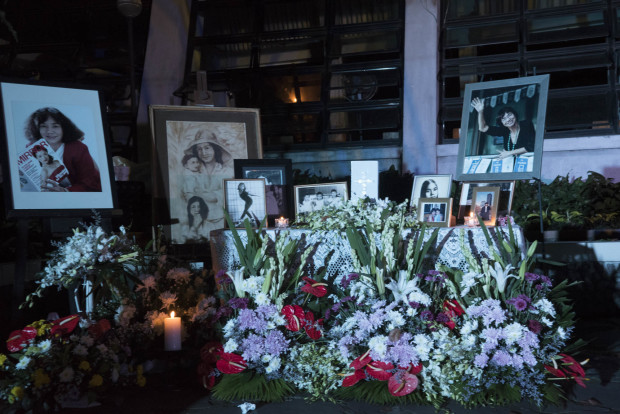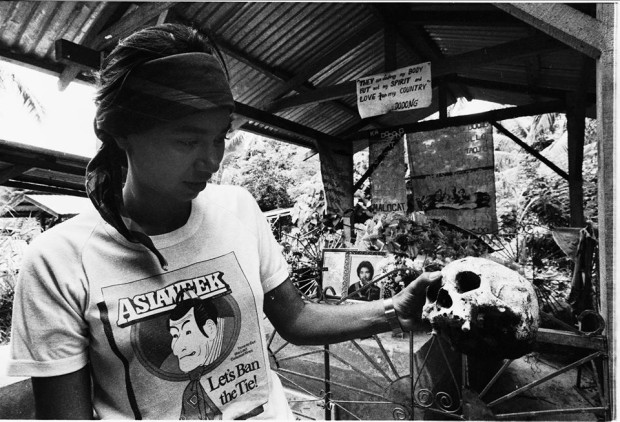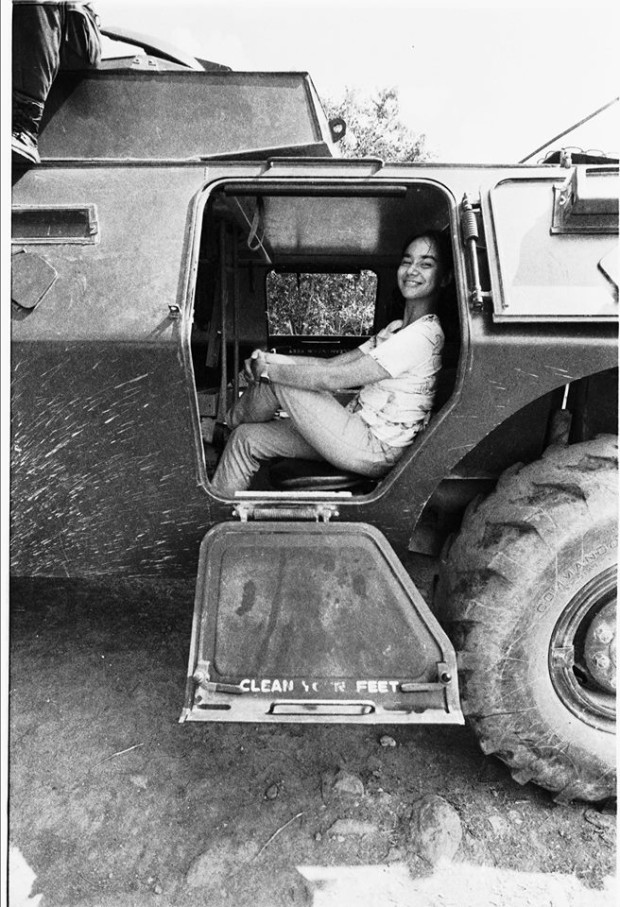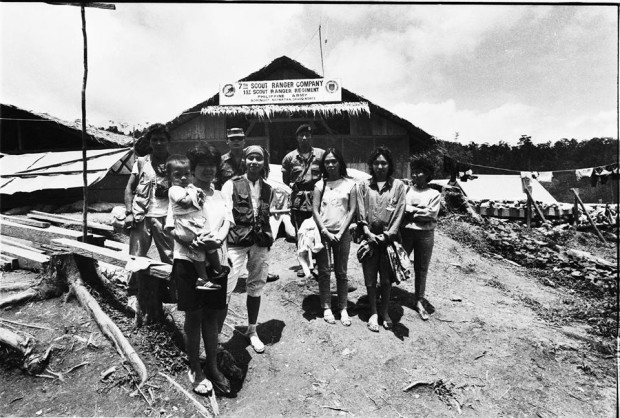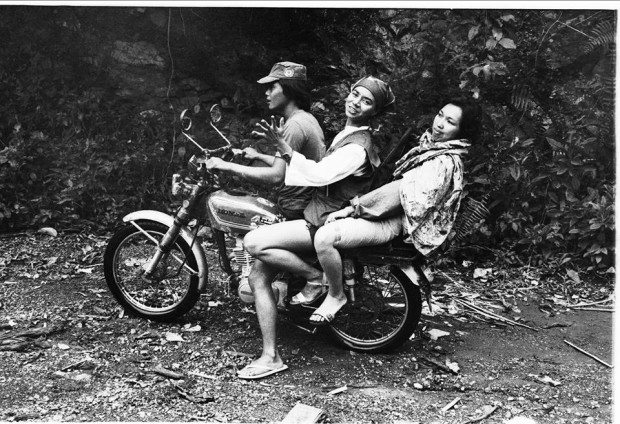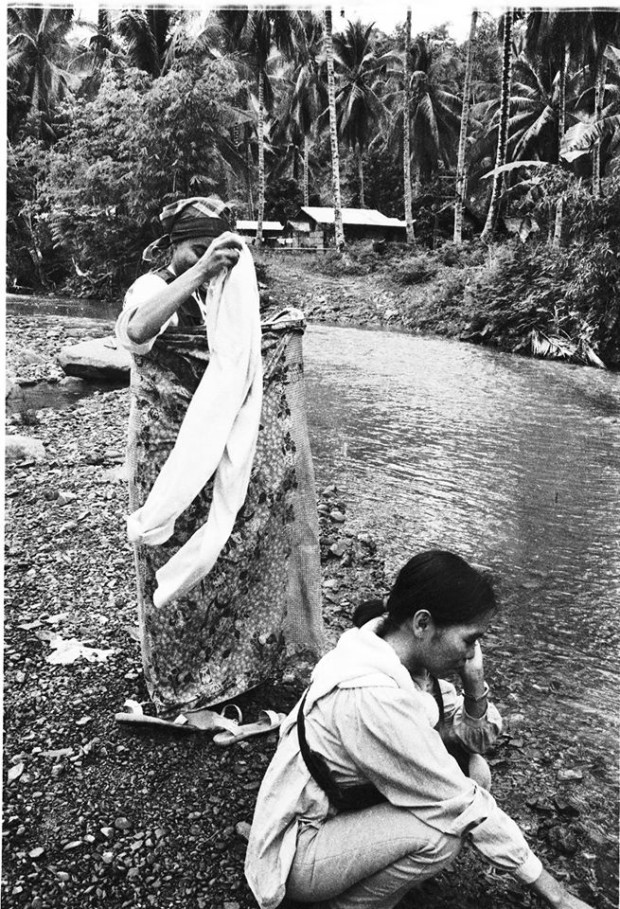Remembering Monica Feria
Eulogy by Mon Jimenez
Hindi dapat namin ka-batch si Monica.
Nagkataon lamang na iniwan niya ang kanyang mga kasabay sana sa high school dahil nag-leave siya ng isang taon.
Kaya pala naman, nang magkakilala kami, parang mas advanced ang kanyang pagiisip at pag-uugali sa amin. Nasindak ang lahat sa kanya.
(It also made a difference that Monica was “hot”. At a time when “hot” was not even an expression yet!)
Article continues after this advertisementMonica seemed to be a bit more mature, a bit more aware, a bit more self-assured than we were. Of course, we found out later that it wasn’t because she was older than we were. What she was — was she was BOLDER than we were. Pati sa pagsasalbahe, ahead siya. Smoking and other things.
Article continues after this advertisementHer confidence was obvious from the start. Meron siyang natural na lakas ng loob. That is why all the members of our batch would just automatically acknowledge her as one of our leaders.
Kung tutuusin, if we were to review all that went on during the colorful years in U.P. High School, because we were in the middle of the most tumultuous years of activism — Monica was our very first POLITICAL LEADER.
She was so skilled at leading that Noli Malvar, another batch mate mis-appropriately described Monica as an expert at “politic-ay-zing the masses.”
This was no small achievement, because we did not all begin from the same level of awareness. Many of us were still struggling with old notions of political action. It was Monica’s kakulitan (when kakulitan was not even a word yet) and her strength of conviction that –in various ways and at varied levels — that kept us committed to “pakikibaka”.
Of course, she was way ahead of us in that field as well. Beside her, we always felt more moderate and not fully radicalized. Soon enough, as we grew older, Monica, our political leader, became our POLITICAL CONSCIENCE.
And so, as we moved on in life, and as we found ourselves in various situations that called for political action, we always asked ourselves what Monica would do.
We never told her this.
Which is just as well because she would simply have scolded us to do what we knew was the right thing to do in the service of the people.
Finally, not everyone’s image of the confident and disciplined Monica Feria is of the fist-waving activist, or the courageous and fearless journalist.
We, the U.P. High Class of ’71 will summarize all she was with a much more symbolic picture : her poise, her courage, her confidence on the balance beam in the U.P. gym… as she executes a perfect backward cartwheel. That was Monica in a single idea.
#######
Eulogy by John Lesaca
Monica Feria: Gone ahead as usual.
Growing up as neighbors in the rustic community that is Area 1 inside the UP Campus, I was not too close to Monica as grade schoolers. She would hang out with my older siblings when we were kids and I could only hang out when I was allowed to do so. I was focused on playing the violin and other musical instruments.
Monica was the very first mestiza that I ever knew. Her fair skin, her facial features were so American. But when I would hear her speak in Pilipino (slang at that, as most pre-teeners would do) I knew that she was one of the boys.
She had her own antics like the rest of the neighbors. I remember when she, her sister Chuki and neighbor Risa Lansang-Reyes would ride the bicycles around the grassy rotunda-cum-quadrangle beside their home. How they would not step on the breaks on the steep (at that time, it was very steep for me) downhill road and accelerate towards the sharp curve to the right passing through their house. They didn’t make it past their house because the high speed prevented them from negotiating the curve and crash right smack into the garden of the Agbayani house at the end of the sharp curve. Saket!
Monica was very graceful as a ballet student and as a gymnast. I would peep into their house and their next door neighbor’s house (the Piñons) where Trudle Pinon taught ballet. Monica was such a sight to behold and I must admit that she was pretty and so cute she was my bigger version of Tinkerbell, the fairy from the story of Peter Pan. I would see her fly across the floor in her tutu, effortlessly, smiling like this was her kind of life. I actually thought the tutu was like a pair of wings that made her fly.
And then High school came. Monica spent a year in USA with her family and when she came back to Manila, we were now batch mates. And so I came to know her better.
She had this aura of self-confidence and I could only look in awe at the way she carried herself. Monica showed to one and all that she could be as gago as the rest of us, trying to be adults smoking cigarettes, or be as stately and behaved (she actually was able to pull this one off!). And while I would play basketball with batch mates almost all afternoons after classes at the UP Gymnasium, I would stop and watch her gracefully tackle the balance beam, practicing, practicing and practicing until she got it right. Then we would eat turon or hang out at the Drive Inn.
The senior part of High School was quite turbulent for us. The First Quarter Storm was approaching. While we were being attracted and invited to attend DGs (discussion groups), I would be surprised to see Monica being one of those who would speak and conduct the discussions. She was very politically aware of what was happening, while we were just beginning to open our eyes to what was happening around us.
This would continue throughout college and while we had different courses and different majors that required us to move from building to building taking the “ikot” jeepney, we would always manage to spend time to hang out in our tambayan at the FC (Faculty Center) steps or at the kiosk nearby.
Monica firmly believed that she was an agent for change and she spent all her life making a difference in everyone’s lives without really trying. But we could see what she was doing and she gained our respect.
College passed us by. We started to get our lives back. By this time we realized we were going to be the next generation to take over our parents. And take over is what we have been doing. Our outlook, our sense of activism somehow mellowed with the arrival of sons, daughters and grandchildren.
Instead of asking each other if one had tried smoking this brand of cigarettes or tasted that kind of beer scotch or other poison, we were now comparing notes on maintenance medicines and medical treatments.
It was time to pass the torch.
Last December 20, I found out that Monica was sick. No wonder she didn’t answer my text messages asking if she will be able to join our batch get-togethers, especially the Christmas dinner.
I thought that it was just one of those things. And then, at a “wanner” party for friends and former neighbors at Area 1, a friend whispered to me that Monica was very sick and her sisters were scheduled to fly back to Manila. Kinabahan ako bigla.
Our batch mates started to talk about Monica’s condition in our Viber group and we started a prayer rally. Monica’s sister Chuki contacted me and said that Monica was at the ICU of PGH and visiting hours were at 4 – 7pm. I made it a point to visit her the next day, December 30 at 4pm, never mind the traffic.
I was shocked seeing Monica like that on the hospital bed. This wasn’t her. I was staring at a shell of Monica. The lovely face that I knew was so full of life and energy, was tired. I was not sure if she sensed my presence but I held her hand and started praying. I knew that she was going. I whispered in her ear who I was, and I started telling her about our childhood days and high school adventures. And lastly, I told her that I knew she didn’t want to be seen like that and I knew she didn’t like visitors. If she needed to rest, then please go quickly, we would all understand.
As she lay on the bed, I felt this sudden sense of sadness.
The Tinkerbell of my childhood had grown up. The wings were shed. She wasn’t able to fly anymore. The radiant light, the aura, began to dim.
That same evening, at around 9pm, Monica left Never Never Land.
Our batch was devastated. By now, we had grown to be very, very close to each other. Our families were each other’s families. And we grieved and cried as a batch of Hunghangs do.
I always believe that the ultimate test of love is in letting go.
We love you, Monica.
Bye, Monica…
######
Eulogy By Chelo Banal-Formoso
Rest in peace, Monica.
The last time I saw you was at this dinner for our little group of Saturday editors very early in November. You sat next to me and tasted everything. You ate a lot, laughed a lot and talked a lot. You kept protesting Bill’s retirement. Too bad Bill was not at the Cabalen dinner. He would have felt good upon hearing what you had to say about his integrity and competency.
Bill and I were both shocked and saddened to hear that you were in the ICU and that, in just a few days, you had been called to the light. I feel he is a lot more shaken by the news, having worked with you in the same editing team all those years.
Not that we didn’t go a long way back. You were quite a campus figure back in UP although we hardly knew each other then. In the time of the dictatorship, you were a political detainee; I was a coward. You reported for the Daily Express; I wrote for the Sunday magazine of the Manila Bulletin. You stayed; I left. But our paths crossed again after I returned home and wrote a commentary for the Inquirer. You rang me up and offered me a column in the weekly Mirror magazine that you were editing. I accepted the offer. But sooner than later, I joined the Inquirer and, after your magazine had ended its run, so did you.
Office friendships are usually formed casually and slowly over the years. For the Inquirer editorial team, they also developed deliciously. Tired of eating restaurant food all week, a group of editors hatched the idea of a Saturday afternoon potluck of homecooked food. So over the years we have come to associate one another with certain dishes.
Many times, we feasted on your tacos, Monica. Damn good tacos that came with sundry garnishes that must have been quite tedious to prepare, especially for an editor who worked late nights. And now I will never be able to eat tacos without thinking of you.
I remember too your assorted deli meat, cheese and bread. One Saturday, you asked if I had eaten some of the ciabatta bread that you brought in. “I heard you say you like ciabatta so I bought some,” you told me. It was really nice of you to have done that. And now, my sweet friend, I will never be able to eat ciabatta without a fond thought of you.
It just occurred to me that today is Saturday.
Monica, you will be missed, today and forevermore.
#####
My friend Monica Feria–of the white-as-snow undies, erotic poetry and ‘glad grace’
By Elizabeth Lolarga
These remembrances were read Thursday night at the memorial for journalist Monica S. Feria at the rock garden of the Church of the Risen Lord, University of the Philippines, Diliman, Quezon City. Monica died at age 62 last Dec. 30. She was an Inquirer desk editor.
The first time I met Monica formally was in our employer’s office, Philippine Daily Express in Port Area, Manila, in 1976. I was a new reporter assigned to the Life and Leisure section.
Newspaper people in those days were mainly made up of men, the unfriendly sort whose noses were close to the grindstone. Monica went out of her way to welcome me to the team.
What bound us, apart from the Express, was we were both working students at the University of the Philippines (UP) Institute of Mass Communication. She enjoyed a celebrity status there because of this, and because her byline appeared with some frequency on the front page.
But she wasn’t a total stranger to me. She was friends first with my older cousin, Allyn Lolarga Valdellon, a broadcast communication major. Binilin ako ni Allyn kay Monica since Express was to become the first of my many journalism jobs.
Half in love
In the newspaper then, we enjoyed only one day-off. Mine fell on a Thursday so it would allow me to attend classes. Saturdays and Sundays were slow news days. Nonetheless, I reported for duty to close advanced Leisure pages for the Monday and Tuesday issues.
One early Saturday afternoon when the slots of the all-male news desk was unoccupied, Monica sashayed by my cubicle wearing a pair of batik wraparound pants. Then her pants, held together by a fragile string and the tiniest of safety pins, fell, revealing to me her white-as-snow panties. I half hugged her from behind and helped put her pants back on—with one eye cast on the rest of the newsroom.
Monica gasped, “Mabuti ikaw lang ang nakakita, Babeth!”
I suspect that the boys in the newsroom, from the copy boy to the editor in chief, were half in love with Monica. In love but not in the leery or lustful sense, more of what William Butler Yeats wrote in his poem “When You Are Old and Grey”: “How many loved your moments of glad grace/And loved your beauty with love false or true/ But one man loved the pilgrim soul in you/And loved the sorrows of your changing face.”
First book
I’m grateful to Monica for agreeing to read aloud my poems at the launch of my first book, “The First Eye,” on Oct. 15, 1990, traditionally observed as World Poetry Day.
She was then big with child. She shared, with our actor friends Dodo Crisol—may he also rest in peace—and Gigi Dueñas, a big four-poster bed, handcrafted by Bob Feleo. Monica surprised everyone gathered at Hiraya Gallery with her passionate reading of some erotica, despite a belly so huge she seemed ready to pop anytime.
Monica was also my editor when I contributed to the now defunct Mirror Magazine. I was encoding and composing at the same time my profile of then senatorial candidate Haydee Yorac in one of her office’s computer terminals. Monica understood the “messiness” of the writing process.
By 9 p.m., which was late, I still wasn’t ready with my copy. She said she needed to go home to her daughter Jasmin and her family. Not once did she lean over my shoulders to check on the progress of my work. There was that trust between professionals that, yes, I would be able to deliver.
Because she didn’t apply full-blown pressure on me, I was more relaxed and reached my story’s end, appending a hashtag after the last period.
Cultural workers
One last memory of Monica: In February 1997, we attended a meeting of women cultural workers called by the National Commission for Culture and the Arts. After about an hour or so of grim and determined brainstorming about arts-related projects that would benefit women (there was a budget that ran into millions), Monica raised her hand from where she was seated and said, “Bakit hindi na lang natin paghati-hatian yung pera? Happy pa tayo!”
Of course, that was said in jest, and Monica meant to lighten the mood.
Ngayong gabi, paghati-hatian natin ang kalungkutan sa pagpanaw ng mahal nating Monica sa pamamagitan ng pag-alaala natin at pagtanggap na bumalik na siya sa Dakilang Kaliwanagan sa langit. Maging happy tayo.
Monica believed in and worked for the liberation of Filipino women, of the Filipino people. Let us rejoice that she is now liberated from the world of pain and suffering, from the dailiness of deadlines. —CONTRIBUTED
